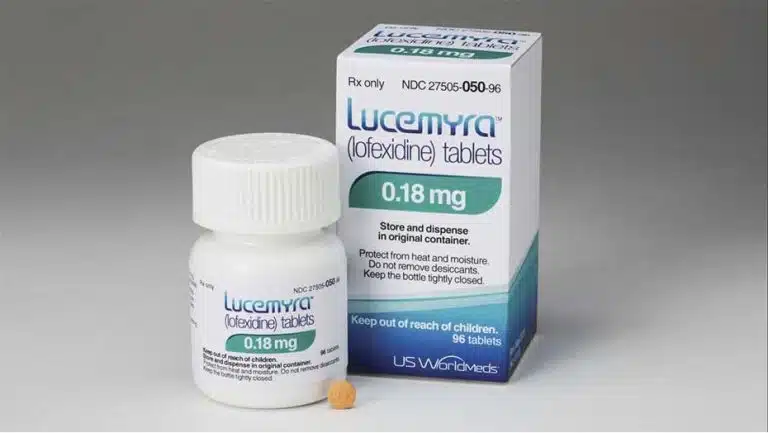Lucemyra (lofexidine) | Uses, Dosage, Effects, Interactions, & Warnings

Lofexidine (brand name Lucemyra) is a central alpha-2 adrenergic agonist prescription drug used to help treat symptoms of opioid withdrawal that occur when a person abruptly stops taking their opioid medication.
When the non-opioid Lucemyra is taken, blood can flow more freely through the body due to the relaxation of blood vessels.
Lucemyra blocks the release of norepinephrine and binds to receptors in the brain. Because of this, the withdrawal symptoms caused by opioid abuse may not be as severe and can be treated with Lucemyra.
Lucemyra Uses
Although Lucemyra has been used in the past to help treat high blood pressure, the medication is the first non-opioid approved by the Food and Drug Administration (FDA) to help with the mitigation of opioid withdrawal symptoms.
The medications Clonidine (Kapvay), paroxetine (Paxil), and naltrexone (Vivitrol) are also medications approved by the FDA to help treat opioid withdrawal symptoms.
Opioid Withdrawal
The FDA-approved Lucemyra helps to treat the numerous withdrawal symptoms which can occur when abrupt opioid discontinuation takes place. More specifically, those suffering from an opioid use disorder or opioid addiction may experience symptoms that are severe.
Relapsing on opioids due to withdrawal symptoms can increase the risk of opioid overdose. Some of the opioid withdrawal symptoms that may be treated by Lucemyra consist of cravings for the drug, sleeping difficulties, and muscle cramps.
Lucemyra Dosage
According to the FDA, Lucemyra can be prescribed as 0.18 mg tablets which appear round in shape with the imprint “LFX” that should be taken 4 times daily, or every 5-6 hours. Your healthcare provider can assist in finding which dosage is right for you.
In fact, your doctor may prescribe lower doses of the drug, depending on the severity of withdrawal symptoms a person experiences.
Be sure to follow the prescribing information that comes with your medication, and if you accidentally skip a dose of Lucemyra, take your next dose at your regular scheduled time.
Side Effects Of Lucemyra
Although Lucemyra helps to curb the effects of opioid withdrawal, Lucemyra may cause a person to experience a number of side effects.
Common Side Effects
Those who take Lucemyra may experience side effects such as:
- lightheadedness
- dizziness
- sleepiness
- dry mouth
- drowsiness
- slow heart rate
Serious Side Effects
The lightheadedness a person experiences is one of the symptoms of low blood pressure which can occur. Orthostatic hypotension, or a sudden drop in blood pressure, may take place if one stands up too quickly.
Cardiovascular issues may arise in those who have heart problems. This is due to the bradycardia, or slow heartbeat, which can take place and result in serious health issues.
If you or a family member have a history of heart problems, including QT prolongation or long QT syndrome, notify your healthcare provider immediately. High blood pressure and other side effects that affect the cardiovascular system can create life-threatening medical emergencies.
Learn more about Lucemyra (lofexidine) Side Effects
Lucemyra Warnings
A number of adverse effects may take place when Lucemyra is taken. For instance, women who are breastfeeding should seek the medical advice of their doctor before taking Lucemyra.
Drug Interactions
Those who take Lucemyra should avoid combining medications as certain drug interactions may occur. Speak with a healthcare representative before taking any of the following substances with Lucemyra:
- alcohol
- sedatives
- supplements
- antidepressants
- opioids
- benzodiazepines
- barbiturates
- antihistamines
Lucemyra Overdose
A person who combines medications or takes Lucemyra not as prescribed may have an increased risk of an overdose.
Those suffering from a Lucemyra overdose may experience serious sedation and faintness. Depending on the other substances involved, the method of treatment will likely vary.
If you or a loved one struggles with prescription drug abuse, contact us today for information on our inpatient and outpatient treatment plans.
FAQs
How Much Does Lucemyra Cost?
How much Lucemyra costs depends on whether you have insurance or not. If you don’t have insurance, it can be well over $1,500 for 84 tablets. However, if you do have insurance, it can be free or you may only be charged a small copay.
Learn more about Lucemyra Prices
Written by Ark Behavioral Health Editorial Team
©2024 Ark National Holdings, LLC. | All Rights Reserved.
This page does not provide medical advice.
Food and Drug Administration (FDA) - Lucemyra
The Mental Health Clinician - Lofexidine for acute opioid withdrawal: A clinical case series
National Alliance on Mental Illness - Lofexidine (Lucemyra)
National Library of Medicine: MedlinePlus - Lofexidine
Psychopharmacology Bulletin - A Comprehensive Update of Lofexidine for the Management of Opioid Withdrawal Symptoms

Questions About Treatment?
Ark Behavioral Health offers 100% confidential substance abuse assessment and treatment placement tailored to your individual needs. Achieve long-term recovery.
100% confidential. We respect your privacy.
Prefer Texting?
Our friendly support team is here to chat 24/7. Opt out any time.







 Learn More
Learn More








